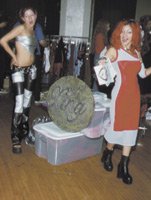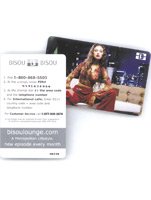Fashion Companies Try New Alternatives to Traditional Marketing
How does a retailer cut through the visual cacophony of Las Vegas to drive traffic to its stores? That was the challenge for Jonathan Paul, creative director for Bisou Bisou. The Los Angeles-based contemporary manufacturer and retailer needed a strategy to bring customers to the company’s two new Las Vegas stores. Paul reasoned that a billboard would be easily overshadowed by the flash of Las Vegas, while advertising in local publications—catering mostly to tourists—wouldn’t be effective enough at reaching hip, young local customers, whom he calls “total Bisou Bisou girls.”
“There really is no successful outdoor campaign that you can do [in Las Vegas] short of a hot air balloon,” Paul said.
So Paul decided to launch a “tell-a-friend” type of strategy to create a buzz, much like the one pioneered by cosmetics giantEsteacute;e Lauder in the 1940s to make herself a household name.
Bisou Bisou is one of several companies looking for new alternatives to traditional marketing. Even big companies and retail chains with seemingly endless advertising budgets are utilizing unconventional strategies to market their brands.
Manufacturers on the scale of Los Angeles-based junior manufacturer XOXO are recognizing the benefits of this type of alternative marketing. The young contemporary manufacturer—a division of Aris Industries, which produces high-profile labels including Perry Ellis and Fubu—has the marketing budget to advertise in high-priced glossies such as Vogue and InStyle, but recently placed a two-page center spread in Magnet, a Los Angeles- and Las Vegas-circulated nightclub guide. The ad, which ran in the magazine’s November issue, offered a 10 percent discount at XOXO’s Beverly Hills, Calif., store.
“We didn’t have to do that; our company is big enough that that wasn’t necessary,” said Aaron Smith, vice president of marketing for XOXO.
“But it was a smart way to bring back that customer, who I think probably feels a little bit abandoned.”
Reaching that young, trendsetting customer is crucial for companies like XOXO, said Smith, who was a nightclub promoter before he joined XOXO’s staff.
“I wanted to reach that customer who feels the vibe of what’s going to be the next big thing,” he said.
The response to the Magnet ad was so successful Smith said the company plans to do the promotion again.
XOXO is also considering hosting fashion shows at several Los Angeles nightclubs, according to Smith, but he questioned the impact of a show in such a venue.
“I don’t know if I want to put on a show for people that are wrecked on drugs and have the attention span of bugs,” he said.
What is definitely in the works is a 1980s-style national mall tour, complete with runway shows scheduled to take place during the first couple months of this year, Smith said.
“It sounds a little old-fashioned, but I think its really smart to stop the customer while they’re in the mall shopping,” he said. “I’m confident it will work.”
Reaching the Unreachable
Alternative or grass roots marketing reaches the “unreachable” consumer, according to Jed Wexler, co-founder of Los Angeles-based Ritual Events & Marketing.
Ritual hosts a biannual fashion and music expo in Los Angeles, which it recently took on the road for a six-city national tour last fall.
“These people are the most cutting edge—they completely dictate what the huge trends will be,” said Wexler. “They’re way ahead of the curve. It’s not necessarily all club kids, it’s everybody that has this progressive taste.”
Bisou Bisou’s tell-a-friend campaign in Las Vegas also seems to be reaching the elusive local customer, according to staffers at the Las Vegas stores, one in the Fashion Show mall and another recently opened in Desert Passage in the Aladdin Hotel.
The campaign works like this: The staff hands out specially printed cards to hip young things around town promising an “exclusive” discount on merchandise at either location. Shoppers receive a $100 gift certificate if they recommend 10 friends shop in the store. Names are kept on file to ensure that customers are recommended by a member of the buying club.
These strategies are “like dropping a pebble into a lakehellip;it starts small and just mushrooms out,” said Wexler.
“This kind of marketing is really hot and definitely here to stay,” he said.
Partnering with a marketing company such as Ritual that has strong ties to artists, musicians and other hipsters helps companies create an “image that is palatable to the tastemakers they are trying to reach through these more non-traditional forms of marketing,” Wexler said. “If you’re going to do it, you have to do it the right way.”
Santa Monica, Calif.-based retailer Dungarees has also successfully taken his marketing message to the streets of Westside Los Angeles.
Robert Keirstead, partner in the contemporary retailer, recently hired smartly dressed women to pass out fliers on the campus of nearby University of California Los Angeles. The fliers offered discounts to Dungarees shoppers and gave a rundown of the merchandise carried in the store. He also distributes fliers at local nightclubs and brings in DJs to spin on Saturdays to promote his more urban merchandise.
“I just want to do whatever I can to continuously bring customers in, or at least let them know what we have,” he said.
“We also did a sorority evening thing, where we sent girls to hand out fliers during their formal Monday night dinners—that also worked well.”
But Ritual’s Wexler cautioned that proper research is necessary “to make the immersion seamless.”
“A company has to position its image accordingly for this type of marketing to be incredibly effective,” he said. “It doesn’t always work for the big company that just jumps right into this unknown territory.”
Cross Promoting a Brand
Bisou Bisou’s Paul said he’s constantly on the lookout for new and unusual ways to reach customers and to promote the Bisou Bisou name.
“You either market a brand or you try to market the product—this is marketing the brand,” he said.
The company’s recent promotions included a deal with Bloomingdale’s to distribute Bisou Bisou phone cards to customers, offering 10 minutes of talk time anywhere in the world.
Another promotion partnered with AMC Theaters to package popcorn in chic Bisou Bisou paper bags. The company recently struck a deal with Ticketmaster to put Bisou Bisou ads on concert ticket envelopes.
But these promotions are difficult to gauge, Paul said.
“I can gauge more off phone kiosks in New York than that,” he said. “But I think once you know that something is tried and true, you try something [else] that you haven’t done before just to see what results it may have.”
Building brand recognition—even on the grass roots level—adds value to the label, Paul said.
“It’s not that I think our customer is going to happen to read the back of a Ticketmaster envelope or happen to get one of my phone cards or other giveaways and run to buy Bisou Bisou. But, at least the brand will be familiar to them the next time they are shopping,” he said. “That’s the whole point of marketing.”
Paul’s boss, Bisou Bisou owner Marc Bohbot, couldn’t agree more.
“Obviously the result is very minor compared to a major campaign in a big magazine, but all these little things helphellip;.They’re kind of fun,” he said. “It helps is to keep in touch with more consumers than what we would normally reach.”
























